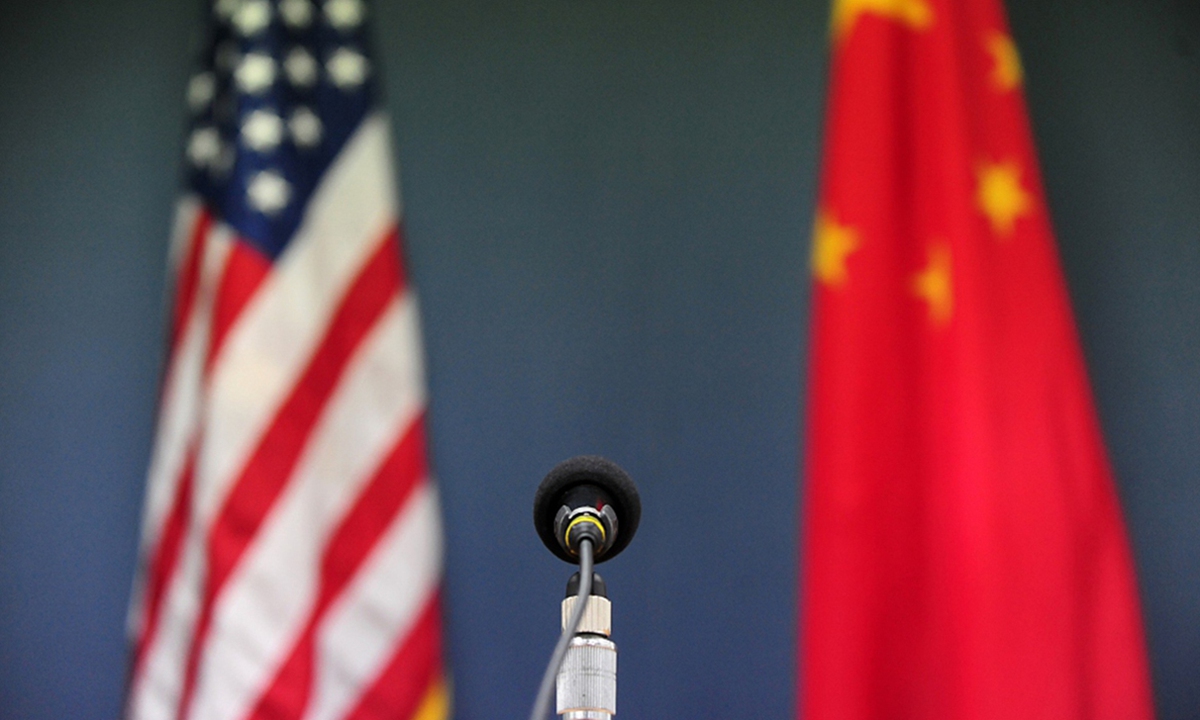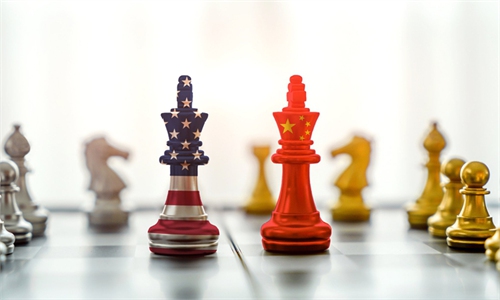
China US Photo: VCG
Chinese Vice Premier Liu He, a member of the Political Bureau of the Communist Party of China Central Committee and chief of the Chinese side of the China-US comprehensive economic dialogue, held a video conversation with US Treasury Secretary Janet Yellen on Tuesday morning. The two sides conducted pragmatic, candid and constructive exchanges on the macroeconomic situation and multilateral and bilateral cooperation. Liu previously held a video conversation with US Trade Representative Katherine Tai on October 9.
Within 17 days, top trade leaders of China and the US had two talks. And China used the terms "pragmatic, candid and constructive" to describe the "exchanges" with the US. Washington said in its statement that it realizes that "developments in our two economies [economies of China and the US] have important implications for the global economy." It can be concluded that these are positive signs worthy of attention.
Addressing the problems of China-US economic and trade relations is an arduous task. How intense had the trade war been, initiated by the US against China since 2018? What sort of ups and downs have the 13 rounds of China-US high-level economic and trade consultations experienced in the past three years?
Looking back at this journey, people should deeply understand how extraordinary China and the US reached an agreement on the phase one trade deal in December 2019. It proves that the two largest economies in the world are able to find appropriate and effective solutions to relevant issues through dialogue and consultations based on equality and mutual respect. From this perspective, the significance of the phase one deal has exceeded the agreement itself. On January 15, 2020, China and the US officially signed the deal. Then-US president Donald Trump praised it as "the biggest deal anybody has ever seen."
People with wisdom always choose to transform experiences into knowledge to help the future journey. The conflicts and negotiations in the China-US economic and trade engagement are not playing house. We can't be prone to repeat the vicious circle. It should be wisely calculated how this process and the outcomes relate to the interests of both countries and the common interests of the world.
The impact of the COVID-19 pandemic lingers on, and the recovery of the global economy is at a critical moment. Only by working hard to ensure the sound functioning of global supply and value chains can countries overcome difficulties as soon as possible. At this critical moment, the ability of countries to adapt to the general historical trend is under test. Whether countries can insist on cooperation while not engaging in confrontation, persisting in opening-up rather than closing their doors, sticking to mutual benefit and win-win while shunning zero-sum games are key factors that determine success or failure.
It's no doubt very important for China and the US to strengthen macro-policy communication and coordination. It must be emphasized that meaningful communication and coordination can only be truly realized based on equality and mutual respect. Only by addressing each other's reasonable concerns through consultations can China and the US create good conditions for the healthy development of bilateral economic and trade relations as well as for the world's economic recovery. China has repeatedly expressed concerns over issues, including the lifting of additional tariffs and sanctions by Washington and the fair treatment of Chinese enterprises. It has also clarified its stance on China's economic development model, industrial policies and other issues. As China enters a new stage of development, it has more confidence and means, and is more capable of safeguarding Chinese enterprises' legitimate rights and interests.
US trade policy toward China is entangled in "coupling" and "decoupling." Earlier this year, the US announced that it would start a "targeted tariff-exclusion process." It will exempt tariffs of US companies which have no supply alternatives than China on a case-to-case basis. It also raised the idea of long-term co-existence and recoupling. All in all, the US is making calculations. Some US politicians try to make a farce out of this issue. But Chinese and US entrepreneurs firmly support "coupling" as they vote with their feet. In the first three quarters, China imported goods worth 852.4 billion yuan ($133.6 billion), an increase of 32.6 percent. Reports from the US-China Business Council and the American Chamber of Commerce in Shanghai have shown that US businessmen are confident in China.
Having a correct evaluation of the benefits of "coupling" and the hardships of "decoupling" is a matter of right and wrong that can determine the trajectory of China-US relations. History has proven that constructive dialogue between China and the US helps steer the wheel of China-US economic and trade relations and benefits the two countries and the world.

